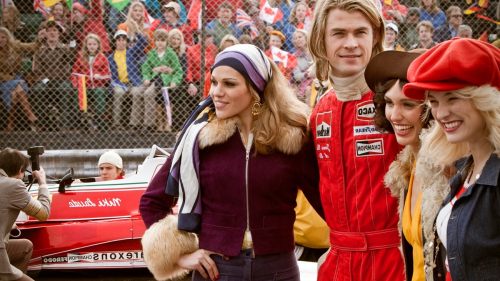A Pair Of A**holes: Ron Howard’s RUSH (2013)
Solo has arrived (and you can snag your tickets here!). To celebrate the latest Star Wars installment, we're running a month-long appreciation of Ron Howard's best movies. The final installment in this mini-series: the 2013 Formula-1 melodrama, Rush...
*****
Formula-1 racing is a rich man's sport, which is why – at least from a superficial thematic standpoint – Rush ('13) doesn't seem like a movie you'd ever expect Ron Howard to make. The true story of '70s track rivals James Hunt (Chris Hemsworth) and Niki Lauda (Daniel Brühl), these two over-privileged assholes are about as far from the heroic blue collar firemen or noble astronauts from Backdraft ('91) and Apollo 13 ('95) as you can get. Nor are they remotely similar to the down and out boxer who raised a family (plus a literally depressed nation) to their feet in Cinderella Man ('05).
In Lauda's opening narration (delivered with deadpan grace by Brühl), he even explains that he never perceived the two daredevils' ostensible win-or-die conflict as a "big deal". "We were just drivers, busting each others' balls," Lauda tells us, moments before a fateful wet run at the '76 German Grand Prix that nearly killed the Austrian sensation, and would leave him horribly scarred for the rest of his days. So, why the hell was Howard attracted to these two self-described "assholes", a pair of maniacs enabled by insanely wealthy men who do nothing but drive in circles seemingly for little more than the thrill of it all? Furthermore, why the fuck should we care either?
Probably because Howard also loves professionals, due to the fact that he's been a steadfast journeyman his entire life: from being born into show business, to his days as a television actor, to his career as a Hollywood studio gun for hire. His respect and admiration for others who are very good at their job practically radiates off the screen in each picture. The Paper ('94) is infatuated with the nitty gritty of journalism, and how those who truly practice it trade in blood, sweat and tears to get their stories right on the page. Apollo 13 is just as much about the NASA engineers on the ground as it is the men stranded up in space. A Beautiful Mind (’01) falls over itself to proclaim John Nash a genius, sometimes at the expense of the facts.
Simultaneously, Howard acknowledges a certain level of risk that arrives with these professional devotions. The Paper’s journos sacrifice their personal lives and standards of living. Backdraft sees brave men running into burning buildings, knowing they may not exit carrying a baby in their arms. As Jim Brackett succinctly illustrates in Cinderella Man, it's better to die doing something you love (in his case: fighting in the ring), because there are plenty of men freezing to death with nothing in the streets, dreaming of even being that lucky. "In my profession - and it is my profession," Braddock plainly says, "I'm more than a little fortunate."
Above all else, Howard loves movie stars, and in Rush Chris Hemsworth combines his director’s almost slavish esteem for the two young mavericks driving featherweight motor vehicles with his own utterly effervescent screen presence. Hemsworth’s version of James Hunt is a joint-toking, hard drinking party boy, who sleeps with nurses (Game of Thrones’ Natalie Dormer) looking to patch him up, and earns his notorious reputation at every turn. He's a pro on the edge, readymade for a Michael Mann picture as he roguishly intones, "The closer you are to death, the more alive you feel. It's a wonderful way to live. It's the only way to drive." Howard's revisiting the man/myth duology that dominated the firehouse in Backdraft and filled out Jim Brackett's trunks. Hemsworth imbues this iteration of Hunt (which is reportedly an extremely embellished caricature) with enough cocksure swagger to fuel thirty Thors. He's beautiful beyond words, and almost supernaturally charming, working double-time to affect an upper crust accent.
Even though Hemsworth gets top billing, Rush belongs to Brühl. This is secretly Niki Lauda's movie, as his attention to every cold, technical detail of racing – from using magnesium parts in the engine, to walking the track at 5 A.M. – dominates the narrative even when he’s driving Formula-3 cars. He's the ice to James Hunt's fire, allowing us to explore the minutiae of becoming a high-speed legend. While Hemsworth's Hunt loves being constantly on the edge of oblivion, throwing up before each event because he knows in his gut that it may be his last, Lauda can't comprehend how a man as good at his art as his rival refuses to care for himself and his car as if they're temples, as opposed to tombs. Like Cinderella Man, Howard's exploring the mentality that mints a God. Only here he splits them into two distinct individuals, who can't exist without the competition the other provides.
It's great that Howard allows us to soak in these rebellious and perfectionist details, because Lauda and Hunt are often deeply unlikable characters. Both are massive dickheads to just about everyone around them, Hunt going as far as to compel wife Suzy Miller (Olivia Wilde) into the arms of actor Richard Burton, while Lauda's exacting methodology makes his teammates hate him (even while winning race after race). For Hunt, it's simply the byproduct of his restless spirit – born to live fast and crash hard (as he eventually dies of a heart attack at forty-five years of age) – while Lauda fears any sort of comfort killing his professional nature: “happiness is your biggest enemy. It weakens you. Puts doubts in your mind. Suddenly you have something to lose." Again, we understand it (and even feel Howard's affection for their motivations), but without two incredible performers, these men would more than likely alienate the audience as well.
Ron Howard has always been an ace at evoking era, and Rush may very well be his best period piece. Regular Danny Boyle cinematographer Anthony Dod Mantle (Slumdog Millionaire ['08]) brings a metallic detachment to the proceedings, never letting all the wild hair and tweedy fashions become overwhelming. Over the top of each image, Hans Zimmer's score is a mix of ambient guitar and his usual bombastic orchestral themes, all slightly tweaked to bring out the sportiest side of this story. Howard's regular editors Dan Hanley and Mike Hill chop it all up into a fast-paced montage, breathlessly speeding toward the finish line as Mantle's camera gets us into the tiny driver's seats and snug helmets, allowing us to feel the adrenaline surge of each race. It's a miraculous work of invisible filmic carpentry, maybe the finest example of Howard piecing every single element together with demanding exactitude.
Some have argued that The Queen (’06) screenwriter Peter Morgan's "print the legend" approach to penning his superlative script may have taken a few more liberties than necessary in order to heighten Rush’s dramatic stakes (example: Lauda wasn't even entered into the Formula-3 race where the film claims he first met Hunt). However, all of Howard's pictures have played fast and loose with the facts over the years (see: A Beautiful Mind erasing Nash's bisexuality, and Cinderella Man's oafish presentation of Max Baer). Even if the title card tells us it’s a “true story”, this isn't a simple factual recounting. If you want that, read the newspaper or watch a documentary (both of which are also usually manipulated, based on the authors' central theses). This is melodrama, where pathos reigns supreme.
Besides, cinema has been measured throughout history by its ability to lie to you well. Mark Zuckerberg never had a girlfriend break up with him (thus motivating the inception of Facebook in David Fincher’s The Social Network [‘10]) either. What matters is Howard’s deliverance of the emotional truth, and the director captures the spirit of professional competition with one of the very best sports movies ever made. So, while inconsistencies may make Rush a better legend, that’s precisely what we signed up for: a mythic representation of men, told by some of Hollywood’s finest fibbers.



